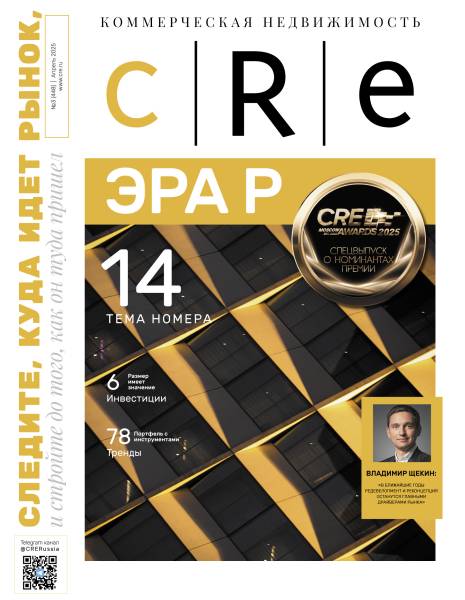All experts are unanimous to recognize the hallmark tendency of the outgoing year being in the asset management market – the active development of this line of business that expressed itself in a brand new approach undertaken by its participants. First of all, the composition of market players has changed. This year Colliers International, which announced development of its Property Management line last year, was followed by other consulting companies that founded departments involved in asset management, including Cushman & Wakefield and Jones Lang LaSalle.
А previously emerging trend in the outsouring of asset management functions has not been too pronounced. “It is too early to speculate on the market’s transition to outsourcing in the property management sphere,” says Leonid Volokh, director of property management at CBRE. “Yet the ending of the reverse transfers of objects from outside management companies to owner’s management companies, dating back to the crisis period of 2009–2010, has brought us confidence and optimism. There is hope that engaging outside asset management companies, to manage commercial real estate objects, will soon become a top-priority practice on the market.”
Another positive phenomenon of the outgoing year for the property management market was end of the practice of management costs' diversification by concluding direct agreements with contractors (cleaning, security, etc.), which has been rather popular with property owners in the first post-crisis years. According to some owners, such approach has really saved some money, but also forced them to undertake some of the management company functions, such as the conduct of auctions, concluding and monitoring agreements with contractors, and assuming responsibility for quality and all risks. They also had to put in much effort to improve interaction with service providers. As a result, they often faced a situation of the “too many cooks spoil the broth” kind. In the end, maintenance budgets exceeded all expectations, while the quality of service left much to be desired. Tenants of such objects did not always appreciate such economy, either. These days, many owners are coming back to the scheme of cooperation with specialist contractors through property management companies.
FM or PM?
Transition from technical management of real estate to its commercial management, which includes a marketing component along with the maintenance part, has been in the top-ten list of topics for discussion in the asset management market. While in 2009, Property Management was regarded as a promising field of activity, which had to be developed in the future, today – just three years later – this issue is being discussed in terms of demand for PM and FM services.
We need to confess there is no simple answer to this question from the market players. Some of them believe that Facility Management is still the most relevant field. “The Property Management market of today continues to be the market of FM services,” commented Leonid Volokh. He believes that owners still prefer to keep commercial management in their own hands.
On the contrary, other market participants are confident that technical property management is beginning to retreat. “In our opinion, the FM market is not developing anymore, but is frozen,” shares his views Sergey Akulich, vice president of the management company Blackstone Keeping Company. “Today, an owner rarely engages a management company merely for maintenance; he needs more to have a PM, in which he can see certain distinct advantages.”
There are also those who keep to a centrist position, so to say. “Today, Russia’s property management market is actually represented by Facility Management services, with elements of Property Management,” says Andrey Siniavin, director of consulting at Sawatzky Property Management.
In spite of their different viewpoints, all market players agree that the situation is changing to favor ensuring maintenance of a building, together with facility management in general. They see it as a merit of the owners who came to realize the need for third-party management, and of the asset management companies, which, by combining the two lines of activity, show an alternative and a more efficient way to manage a real estate object.
Square meters
As before, the main area of interest for management companies in 2012 were new real estate objects. According to Cushman & Wakefield, by results of the first three quarters of the year, the volume of commercial real estate in Moscow Oblast increased by about one million square meters. Of these, the office segment accounted for 395,000 sq.m, warehousing – for 530,000 sq.m, and the smallest increase was shown by the retail properties segment – only 66,000 sq.m. However, this cannot be said to offer much space for development of the management company business. According to experts, even if we estimate the share of facilities managed by professional management companies at 40–50% of the real estate under construction, outside management companies had no more than 500,000 sq.m to work with in the outgoing year.
In addition, given that construction, of many of the objects commissioned this year, started in the pre-crisis “megalomania” period, when project areas were measured by hundreds of thousands of square meters, the figure of 500,000 sq.m is pretty small for such a crowded market – in terms of the number of market participants – as that of Moscow. Let alone the fact that various segments of real estate have different earning capacity. For example, with warehousing real estate (which accounts for the largest share of space commissioned in 2012), one cannot expect to have significant maintenance budgets; according to market participants, in this segment they have to work virtually within an inch of zero profitability.
According to market players, most of the 2012 auctions still concerned the so-called secondary market, i. e. the market of facilities already in operation. Yet getting there is difficult, due to the fact that their owners are accustomed to maintain the “historically formed” pattern of control.
Value in dispute
According to a survey of real estate management market participants, the average cost of services in property maintenance in the outgoing year ranged from $30 to $50 per sq.m of total area per year, VAT exclusive. This does not include the cost of general utility payments, property taxes, insurance and other expenses, which the owner eventually charges to his tenants. For ‘Class A’, this figure ranged between 45–70 USD per sq.m per year; in ‘Class B’, this was about 35–60 USD per sq.m per year, and in the retail property segment, maintenance service costs amounted to 30–50 USD per sq.m per year. The lowest cost was found in the warehousing segment – 10–15 USD per sq.m per year. In 2012, the award of the management company itself referred to as the Management Fee ranged from 7 to 12% of the total budget allocated for the property maintenance.
As for integrated management, the calculation here – as well as before – was formed on the basis of net rental income, and according to Colliers International, it ranged from 1% to 2% in Moscow, from 1.5% to 2.5% in St. Petersburg, and from 2.5% to 4% in the regions. It has to be emphasized, though, that the percentage is formed from net rental income.
House management
Another issue on the current agenda of property management market in the outgoing year was reclaiming the residential property market. Some two years ago, professional management companies were very skeptical when mentioning this segment. Today, many of them find the residential property market very promising. According to a survey, the most attractive projects in this segment for management companies are business-class housing, and the so-called “club” premium class houses with a small number of apartments. This year, the list was supplemented also by suites.
From the legal point of view, suites are commercial real estate, the presence of a management company is planned from the very start, say the experts at Jones Lang LaSalle. From a technical point of view, by the composition of engineering systems and a set of maintenance services, such facilities are no different from office or retail properties. "The peculiarity in servicing suites building is the skill to arrange this work so as to take into account the individual needs of suite owners. As practice shows, the requirements for the level of comfort in offices are generally lower than those for a suite. This is easy to understand, because people spend only a part of their time in the office. Managing such an object involves more customer-oriented services that allow suite owners to solve everyday problems in a quick and efficient way, without leaving the comfort of their homes," says Alexey Siniavskiy, director of maintenance for Sminex.
Regional issues
Just like before, in 2012 Moscow-based management companies focused on the regions. “Development of the regions, and accordingly, the demand for services of professional management companies is not as active as in the major capital cities,” says Leonid Volokh. “However, it should be noted that almost all companies work with objects located in the regions, and they are willing to move further out.”
At the same time, in conditions of strict economy on operating costs, Moscow-based management companies find it hard to promote their services in the regions. Experts believe that in order to attract a Moscow-based management company, the owner of a regional object must have special reasons, when local resources are insufficient to achieve the desired result. This can be a critical state of the object, or the need to build a quality management model, or the desire to improve the investment value and image of the object by involving an experienced partner, or it can even the confidence inspired by a particular business team. Practice shows that in such cases, cooperation works well. Yet experts do not recommend going into the regions just to win the price war.
не указано
Year's Results on FM-Frequency
According to statistical data, the earning capacity of the asset management market in Western Europe is growing annually by 6–7%. Despite its young age, the Russian asset management market can boast the figure of about 10–15%. Analysts believe that the results of 2012 will be approximately similar. So what were the conditions in which Russian asset management companies found themselves in, to gain such results in the outgoing year?
16.12.2012

3032














